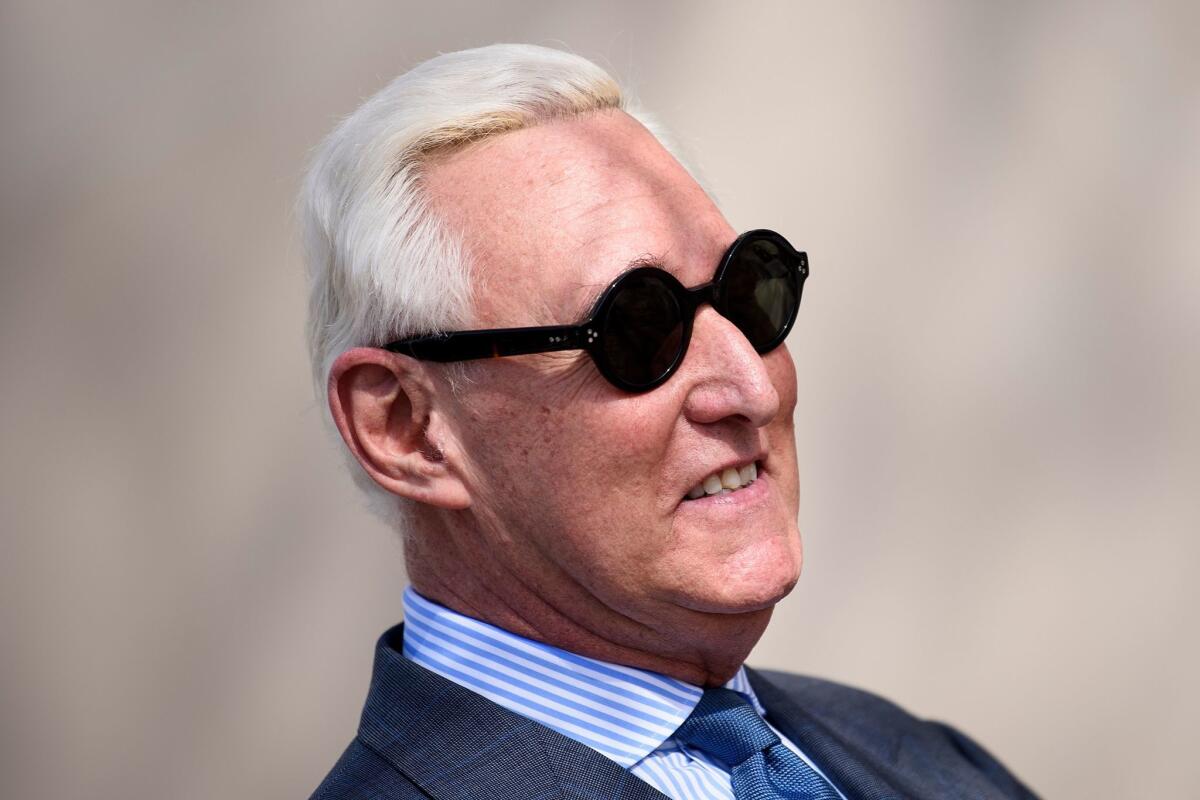Four prosecutors quit Roger Stone case after Justice Department overturns sentencing proposal

Hours after President Trump slammed a recommended prison sentence for his longtime confidant Roger Stone as “horrible and very unfair,” the Justice Department said Tuesday it would seek a shorter prison term, prompting four career prosecutors to resign from the case in protest.
The Justice Department decision to overrule the front-line prosecutors’ sentencing recommendation was highly unusual and sparked concerns that Atty. Gen. William P. Barr, who has strongly backed Trump, was bowing to political pressure to help the president’s former advisor.
It came four days after Trump, newly emboldened by his Senate acquittal on impeachment charges, ordered the recall of his ambassador to the European Union and the ouster of a decorated Army officer from the National Security Council as public payback for their damaging testimony during the inquiry.
Stone, a flamboyant self-described Republican dirty trickster, was convicted last year of lying to Congress, witness tampering and obstructing a congressional investigation into Russian meddling in the 2016 election.
On Monday night, the prosecution team submitted a 26-page memo in federal court recommending a sentence of seven to nine years in prison, in keeping with federal sentencing guidelines. It raised the prospect that Stone, 67, could receive the harshest sentence of the half-dozen former Trump campaign aides and others charged in the Russia investigation.
But on Tuesday, the Justice Department sent a revised recommendation, saying the earlier one “does not accurately reflect the Department of Justice’s position on what would be a reasonable sentence in this matter” and that the actual sentence should be “far less.”
It urged U.S. District Judge Amy Berman Jackson, who is hearing the case, to consider Stone’s “advanced age, health, personal circumstances, and lack of criminal history in fashioning an appropriate sentence.”
The move prompted a swift response from the four prosecutors who took the case to trial.
Jonathan Kravis was the first to resign, both from the case and as an assistant U.S. attorney. Soon after, Aaron Zelinksy, the lead prosecutor on the case, notified the court that he was resigning “effective immediately” as a special prosecutor with the U.S. attorney’s office in Washington, but would stay on as an assistant U.S. attorney in Baltimore.
The other two federal prosecutors, Adam Jed and Michael Marando, also withdrew from the case.
Later Tuesday, the White House withdrew the nomination of Jessie Liu to be undersecretary of Treasury for terrorism and financial crimes, CNN reported. She had headed the office that oversaw Stone’s prosecution. Her Senate confirmation hearing was scheduled for Thursday.
Justice Department officials made the decision to shorten the sentencing recommendation on Monday night, shortly before Trump tweeted that it was a “miscarriage of justice,” according to a Justice Department spokeswoman. Officials said no one at the Justice Department had discussed the decision with the president.
Trump later told reporters in the Oval Office that he didn’t intervene but that he’d have been within his rights to complain directly to the Justice Department if he’d wanted to.
“I’d be able to do it if I wanted,” he said. “I have the absolute right to do it. I stay out of things to a degree that people wouldn’t believe, but I didn’t speak to them.”
He called the sentencing recommendation for Stone “ridiculous,” adding, “I thought the whole prosecution was ridiculous.... It was an insult to our country.”
Trump was back on the attack early Wednesday, tweeting congratulations to Barr “for taking charge of a case that was totally out of control and perhaps should not have been brought,” suggesting the prosecutors had gone rogue.
But critics argued that Trump has shown little respect for the traditional independence and impartiality of the judicial branch of government.
“Presidents and attorneys general cannot put their thumbs on the scales of justice for any reason — including to aid friends and associates — or we cease to be a nation of laws,” said Karen Hobert Flynn, president of Common Cause, a nonpartisan organization focused on preserving constitutional norms and safeguards.
Democrats blasted the decision. Senate Minority Leader Charles E. Schumer (D-N.Y.) urged the Justice Department inspector general to “open an investigation immediately.”
“The president seems to think the entire Justice Department is just [there] to prosecute his enemies and help his friends,” Schumer tweeted.
Sen. Richard Blumenthal (D-Conn.) called on the Senate Judiciary Committee to investigate. “This highly unusual about-face by the department is stunning and alarming, and smacks of dangerous political interference in law enforcement decision-making,” he wrote.
“There shouldn’t be one set of sentencing guidelines for everyone and another set for President Trump’s friends and those who lied to protect him,” said Sen. Jack Reed (D-R.I.). “Clearly, something is rotten here or all four prosecutors wouldn’t have felt it necessary to quit.”
Eric H. Holder Jr., who served as attorney general under President Obama, lauded the prosecutors who quit the case, tweeting that they “have shown more guts — and an adherence to the rule of law — than too many now serving in Washington.”
Since being sworn in one year ago this week, Barr has unabashedly aligned himself with the president, declaring him not guilty of obstruction of justice last spring although special counsel Robert S. Mueller III had pointedly declined to do so and asserting that the FBI’s Russia investigation — which resulted in charges against Stone — had been based on a “bogus narrative.”
It is extremely rare for Justice Department leaders to reverse the decision of its own prosecutors on a sentencing recommendation, particularly after it was submitted to the court. Normally, U.S. attorneys have wide latitude to recommend sentences on cases that they prosecuted.
Sentencing ultimately is up to the judge, who in this case may not be inclined to leniency. Berman Jackson has repeatedly scolded Stone for his out-of-court behavior, which included a social media post he made of the judge with what appeared to be the crosshairs of a gun sight.
The judge barred Stone from social media in July after concluding that he repeatedly flouted a gag order.
Federal prosecutors also recently softened their sentencing position on Michael Flynn, Trump’s former national security advisor, saying they would not oppose probation after initially saying he deserved up to six months in prison for lying to the FBI. The Flynn prosecution is also being handled by the U.S. attorney’s office in Washington.
In their court filing Monday, prosecutors recommended that Stone be sentenced to 87 to 108 months in federal prison — which they said was in line with federal guidelines. The lengthy term would serve to deter others who might consider lying to or obstructing a congressional investigation or tampering with witnesses, they said.
“Stone’s actions were not a one-off mistake in judgment,” they wrote, adding that he “decided to double — and triple — down on his criminal conduct by tampering with a witness for months in order to make sure his obstruction would be successful.”
Stone has denied wrongdoing and consistently criticized the case against him as politically motivated. He did not take the stand during his trial and his lawyers did not call any witnesses in his defense.
Witnesses in the case testified that Trump’s campaign viewed Stone as an “access point” to the anti-secrecy site WikiLeaks, which was in possession of more than 19,000 emails hacked from the servers of the Democratic National Committee and tried to use him to get advance word about hacked emails damaging to Hillary Clinton.
Prosecutors charged that Stone lied to Congress about his conversations about WikiLeaks with New York radio host Randy Credico — who had scored an interview with WikiLeaks founder Julian Assange in 2016 — and conservative writer and conspiracy theorist Jerome Corsi.
During the 2016 campaign, Stone mentioned in interviews and public appearances that he was in contact with Assange through a trusted intermediary and hinted at inside knowledge of WikiLeaks’ plans. But he started pressing Credico to broker a contact, and Credico testified that he told Stone to work through his own intermediary.
Earlier testimony revealed that Stone, while appearing before the House Intelligence Committee, named Credico as his intermediary to Assange and pressured Credico not to contradict him.
After Credico was contacted by Congress, he reached out to Stone, who told him he should “stonewall it” and “plead the Fifth,” he testified. Credico also testified during Stone’s trial that Stone repeatedly told him to “do a ‘Frank Pentangeli,’” a reference to a character in “The Godfather: Part II” who lies before Congress.
Prosecutors also charged that Stone had threatened Credico’s therapy dog, Bianca, saying he was “going to take that dog away from you.”
The Associated Press contributed to this report.
More to Read
Get the L.A. Times Politics newsletter
Deeply reported insights into legislation, politics and policy from Sacramento, Washington and beyond. In your inbox three times per week.
You may occasionally receive promotional content from the Los Angeles Times.







